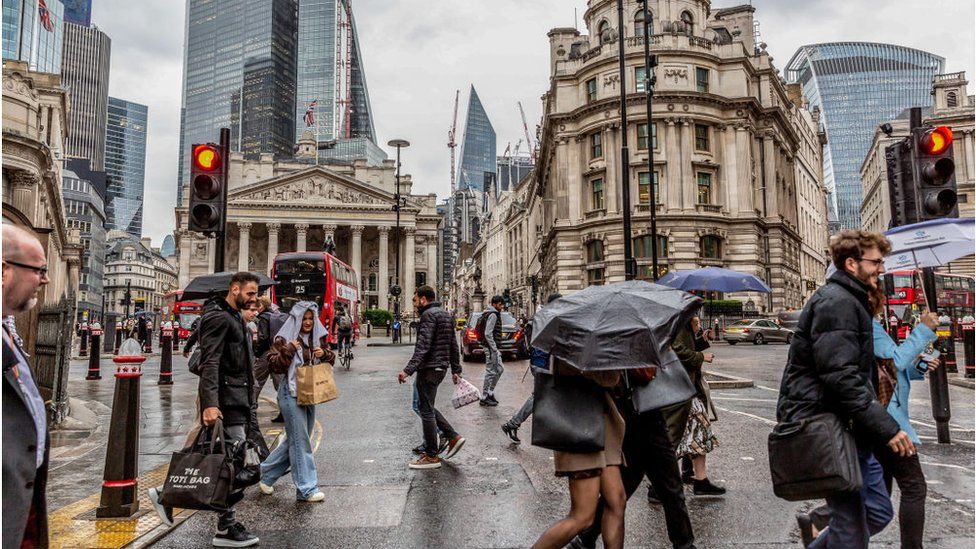Government borrowing costs are almost as high as when the Bank first stepped in to calm market turmoil.
 Image source, Getty Images
Image source, Getty ImagesThe Bank of England has insisted again that it will go ahead with its decision to stop supporting the bond market on Friday after reports it may extend it.
“As it had made clear from the outset”, the help would end on Friday, it said.
The Bank is buying bonds to stabilise their price and prevent a sale which could put some pension schemes at risk.
The Bank’s statement comes after boss Andrew Bailey told pension funds: “You’ve got three days left now and you’ve got to sort it out.”
The pound fell against the dollar to below $1.09 after Mr Bailey’s surprisingly blunt statement on Tuesday evening, which appeared to dash investor hopes of the support being extended.
Government borrowing costs remain close to the levels seen at the height of the market turmoil last month, when the Bank first stepped in.
Mr Bailey told the BBC he had stayed up all night to try and find a solution and said the Bank was doing everything it could to preserve financial stability, but said it had always been clear that the help would be temporary.
Speaking on the BBC’s Today programme, however, Business Secretary Jacob Rees-Mogg suggested that the reason for economic turmoil in recent weeks was down to moves in interest rates, rather than tax cut pledges by the government.
Mr Bailey’s insistence the recent support would end was no slip of the tongue, with the governor going out of his way to say financial giants now had to arrange their affairs.
He said pension funds have “an important task” to ensure they are resilient.
“I’m afraid this has to be done, for the sake of financial stability,” he said.
The interventions by the UK’s central bank were prompted after the chancellor promised huge tax cuts without saying how he would fund them, sparking investor fears over the UK’s financial stability.
The government raises money it needs for spending by selling bonds – a form of debt that is paid back plus interest in anywhere between five and 30 years.
Pension funds invest in bonds because they provide a low but usually reliable return over a long period of time.
However, a sharp fall in their value after the mini-budget forced pension funds to sell bonds, threatening to create a “downward spiral” in their prices as more were offloaded, which reportedly left some funds close to collapse.
The turmoil has also fed through to the mortgage market, where hundreds of products have been suspended as the volatility has made it difficult for lenders to know how to price these long-term loans.
Last week, interest rates on typical two and five-year fixed rate mortgages topped 6% for the first time in over a decade.
‘Uncharted territory’
Earlier, pensions industry body the Pensions and Lifetime Savings Association had warned against the help ending “too soon”.
It suggested the support should be extended until 31 October, when chancellor Kwasi Kwarteng is due to detail his economic plan explaining how he will balance the public finances. The statement will be accompanied by independent forecasts on the prospects for the UK economy.
The government has said it remains confident in its tax cuts plan, with Mr Kwarteng telling MPs he was “relentlessly focused on growing the economy” and “raising living standards”.
But Mr Bailey’s words further increases the pressure on the government, and the chancellor, to come up with an economically credible and politically viable debt plan, and quickly.
Business Secretary Jacob Rees-Mogg argued that the current market turbulence could mainly have been the result of the Bank of England’s failure to raise interest rates in line with US policymakers, rather than the chancellor’s 23 September mini-budget.
“What has caused the effect in pension funds… is not necessarily the mini-budget. It could just as easily be the fact that the day before the Bank of England did not raise interest rates as much as the (US) Federal Reserve did,” he said.
He told BBC Radio 4’s Today programme that “jumping to conclusions about causality is not meeting the BBC’s requirement for impartiality” after Mishal Husain suggested the chancellor’s actions had been the trigger for the fluctuations in the value of the pound and government bonds.
But Labour’s shadow chancellor Rachel Reeves said: “This is a Tory crisis that has been made in Downing Street, and that is being paid for by working people.”
Former IMF deputy director Mohamed El-Erian told BBC News that the economy was on “shaky ground”.
He said financial systems going into turmoil “can cause a lot of damage”.